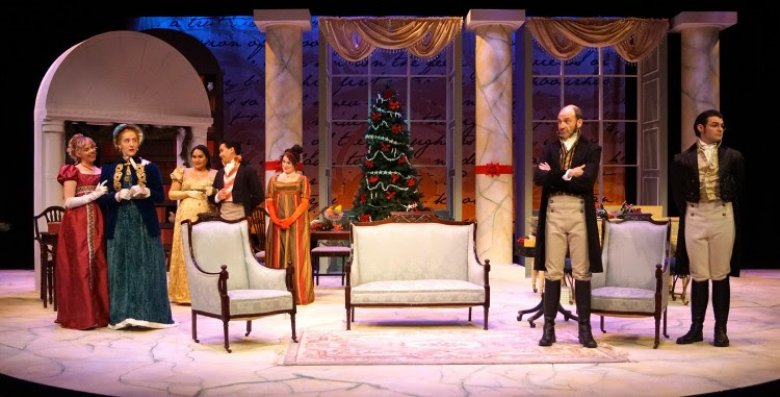Mary Bennet is having an existential crisis, and she is quite at a loss as to what to do about it. The middle of the five sisters in the Bennet family of Jane Austen’s Pride and Prejudice, Mary is the not-very-attractive one who bores people at parties with facts relating to esoteric subjects of interest only to her, lacerates their ears with her insipid play on the pianoforte, and lacks the social graces that include avoiding acerbic remarks in company.
In Miss Bennet: Christmas at Pemberley, the Road Less Traveled Theatre Production now at Shea’s 710 Theatre, two years have passed since the marriage of Elizabeth Bennet to Mr. Darcy, and much has changed for Mary, including the quality of her play at the pianoforte. It is Christmastime and she arrives at the estate in the company of her very pregnant sister, Jane and her husband, Mr. Charles Bingley. No longer satisfied with just her books and her music, Mary longs for something more. She asks, “Can one live a large life in one’s mind alone?” She wants to travel the world outside of books, laments that she suffers from a lack of definition, and feels invisible to her sisters. And, of course, there is the question of love and marriage, subjects she and her sisters previously believed were not within the realm of possibility for her. Mary maintains her character from the original, while having matured a bit in the two years that have passed. It takes some time for her sisters to become aware of how much she has changed.
Invited down for Christmas by his cousin, Fitzwilliam Darcy, the newly-minted, socially awkward, bookish Lord Arthur deBourgh, owner of the fabulous Rosings Park estate now that the formidable Lady Catherine has died, meets Mary in the library and these two 19th century nerds cannot but fall in love in their own uncomfortable manner. Of course, hindrances pop up which must be overcome.
Written by Lauren Gunderson, known as “the most produced living playwright in America,” and Margo Melcon, the dialogue has much of the wit and charm of Austen encased in a script that is mostly predictable, making the play seem a bit plodding at times. The characters maintain their personalities from the book, though, from the giddy Lydia to the refined Darcy. There is enough backstory in the script for audience members who have not read Pride and Prejudice or seen any of the films to understand the relationships and history of the characters. People who are familiar with them, however, will enjoy the allusions to the book that are peppered throughout. There is also a theme of what it means to be free in the dialogue between Mary and Arthur that speaks to the differences between the options for men and women of the time and adds a bit of seriousness to otherwise more comic proceedings.
Alexandria Watts plays Mary. She speaks rapidly and not always clearly, racing through dialogue rather than speaking in a normal cadence. I found it difficult to understand her in longer monologues. She does a fine job standing up to her sisters and demanding that they see her as she is now rather than as she was, and in her furious piano playing, declaring to her sisters, “I’m not upset. Beethoven is!”
Nick Stevens is great as the bumbling Arthur. He stammers and stutters, barely able to speak, sure that whatever he says will be wrong. His physicality when he is nervous is a delight. He is all thrashing arms as he forces words out. He is the perfect isolative introvert who has always lived in his own head and is now faced with a life he neither desires nor understands, and feelings he has no way to define.
Todd Benzin is Darcy and Darryl Semira is Bingley. Mr. Benzin carries the elegance of Darcy well and has impeccable timing in his understated glances and comments. Mr. Semira has Bingley’s warmth and better understanding of new love than his friend. Their different personalities are highlighted in a well-played scene between the two when they discuss Bingley’s coming fatherhood.
Amy Feder has Elizabeth’s light-hearted and mischievous energy, quietly insisting on being her own woman, while Rosa Fernandez as Jane holds the warmth and desire of that character that everyone just be happy as she moves about with the difficulty of a woman in the later stages of pregnancy. Brittany Bassett is very good as silly Lydia. She flirts and giggles in an annoying and desperate manner yet is somehow sweet underneath it all. And Tracy Snyder is superb as Anne deBourgh, who arrives to throw a spanner in the works and give the characters something to plot about. She is haughty and demanding, a clone of her dreadful deceased mother, Lady Catherine, as she roams around disparaging Pemberley and the Bennets.
Direction is by Katie Mallinson. The small, silent, dimly lit scenes in which characters perform tasks or gather for a drink work very well to change the time from one day to the next and provide a picture of country estate living. Set design by Bethany Kasperek provides an elegant setting with marble columns, stylish furniture, the pianoforte, and an indoor Christmas tree that is the subject of much amusement for the guests. The costumes by Jenna Damberger speak to the wealth of the characters—empire waist dresses for the ladies in expensive fabrics, and satin waistcoats and long leather boots for the gentlemen.
Miss Bennet: Christmas at Pemberley is a Christmas frolic with no pretensions that will send you out of the theater smiling and possibly in want of a mulled cider or hot toddy as you contemplate the mystery that is falling in love.
At Shea’s 710 Theatre until December 22nd.

